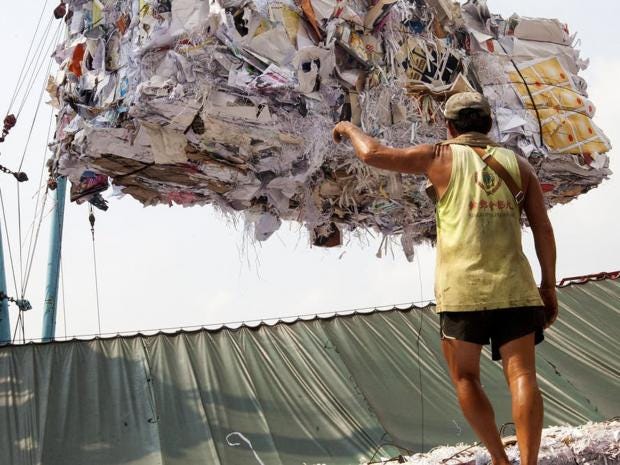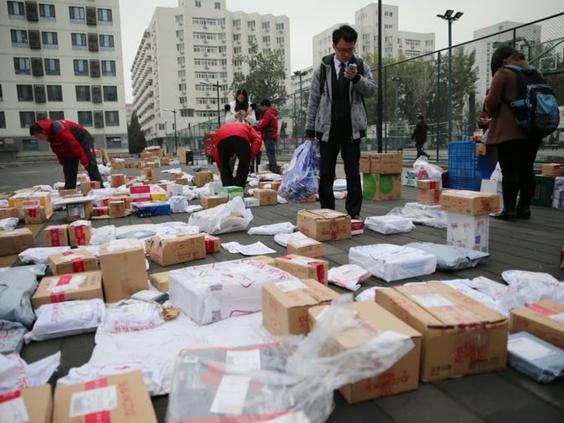The Global Headache of Waste Management
"The dominant position that China holds in global manufacturing means that for many years China has also been the largest global importer of many types of recyclable materials. Last year, Chinese manufacturers imported 7.3 million metric tonnes of waste plastics from developed countries including the UK, the EU, the US and Japan."
"However, in July China announced big changes in the quality control placed on imported materials, notifying the World Trade Organisation that it will ban imports of 24 categories of recyclables and solid waste by the end of the year. This campaign against yang laji, or “foreign garbage”, applies to plastic, textiles and mixed paper. It will result in China taking a lot less material as it replaces imported materials with recycled material collected in its own domestic market, from its growing middle-class and Western-influenced consumers."
"The problems we are now facing are caused by China’s global dominance in manufacturing and the way many countries have relied on one market to solve their waste and recycling problems. The current situation offers us an opportunity to find new solutions to our waste problem, increase the proportion of recycled plastic in our own manufactured products, improve the quality of recovered materials and to use recycled material in new ways."
Christine Cole, research fellow, architecture, design and the built environment, Nottingham Trent University
 |
| China has announced it will ban imports of 24 categories of recyclables and solid waste by the end of the year EPA |
China, in its frantic drive to succeed in its export-driven aspiration, ignored the environmental damage occasioned by lax regulations where the emphasis was on production, and environmental stewardship and public safety was the least of its concerns. Now that the giant country has succeeded in its ambitions, it is putting a skid on its acceleration toward replacing the United States as the largest world economy, a distinction it will reach eventually in any event.
The People's Republic of China has decided it is time to remediate the horrendous impact on its national environment, from the polluting of its rivers with poisonous chemical residues, to the dangerous levels of carbon dioxide and particulate matter in its atmosphere. The ubiquitous coal-fired chimneys spewing black clouds of airborne chemicals and detritus into the air are being shut down. But China will not be completely divorced from coal-derived energy; it plans to build hundreds of coal-burning plants abroad, in undeveloped Africa.
 |
| With a population of more than 1.4 billion, China’s domestic waste management is a challenge in itself (EPA) |
At this juncture China no longer wishes to remain the trash can of the rest of the world, even though much of the trash it receives was derived to begin with from products manufactured in Chinese industry. The immense supply chain stretching from the United States and elsewhere shipping their waste materials to Hong Kong and elsewhere where legions of Chinese are employed in picking through giant mounds of paper and plastic is in a state of expectant disarray. Alternative areas of Asia are being scoped out by scrap dealers; alternates that cannot take up the slack of China's defection.
Chinese government authorities are determined to amend the sacrifices they were once willing to countenance to reach their goal. As they near the height of their economic might, environmental decisions have been altered. Domestic environmental pollution was amplified by a documentary film of a town in the eastern province of Shandong where picking through scrap plastics and processing them in machines belching black smoke turned the geology into a wasteland.
Quite succinctly and correctly, the film's director, Wang Jiuliang, stated that industrial pollution is "not only China's problem. It's the world's common challenge." And so, now the world must focus on its shared challenge as a direct and immediate problem seeking a solution. Port inspections in China in 2013 of imported garbage led to insistence that overseas recyclers invest in new waste-sorting technologies to clean up their operations.
The World Trade Organization was advised by China that it planned to ban 24 types of imported waste, which would include some types of paper and plastics, as well as restricting wastepaper imports. Thousands of small-time scrap collectors sell the waste they carefully sort to traders at collection points in the Mong Kok district of Hong Kong, a semi-autonomous Chinese territory. From there the waste is processed at recycling depots, and exported to mainland China.
But this is a process which is coming to a halt, and where the rest of the world will be tasked with handling their own trash, other than filling up their already over-extended landfill sites.
Labels: China, Environment, Recycling, Waste, Waste Management

<< Home